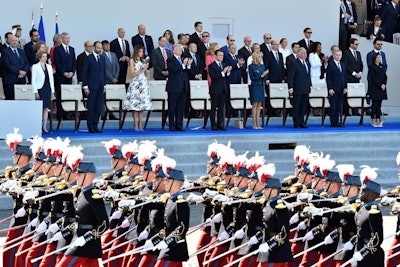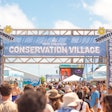
President Trump is moving forward with plans for a military parade to showcase the strength of U.S. armed forces, currently slated to coincide with Washington's annual Veterans Day parade in November. The president is said to have been inspired by the Bastille Day parade he observed in Paris last July as a guest of French President Emmanuel Macron. The idea has had a mixed reception, from critics who see it as similar to propaganda parades in North Korea and Russia to supporters who note that the concept has precedents, like the 1991 parade that celebrated the end of the Persian Gulf War.
As plans move forward, BizBash asked Susan Davis, chairman of Washington-based event production company Susan Davis International, to weigh in. Davis has extensive experience producing events for the military and veteran communities, including last year's Centennial Commemoration Ceremony of U.S. entry into World War I; the groundbreaking of the National Museum of the United States Army at Fort Belvoir, Virginia; and the dedication of the National World War II Memorial.
What tone should the parade strive to set?
Honor, patriotism, and pride come to mind. The parade should strive to pay tribute to our military members and veterans, honor their sacrifices, showcase our military heritage and prowess, and celebrate our freedom. The U.S. tradition is to hold military parades to celebrate victory after conflict. Since America is presently observing the centennial celebration of WWI, it would also be appropriate to connect the dots.
Who would be involved in the planning process?
This parade is integrating with the annual D.C. Veterans Day Parade. It is being planned by the Joint Staff and will be executed by Northcom (Northern Command). No one knows how to do parades better than our military. Having said that, from a content perspective, speaking to the military and veteran community is key. We expect that Veteran Service Organizations, military historians, military academies, and the protocol experts from the Department of Defense would have input, among many others. From a logistics perspective, a full array of D.C. and federal government agencies will need to be involved.
What logistical concerns would you address immediately?
Given that the Department of Defense is planning the parade, many of the normal parade logistical concerns will be easily solved. Flyovers will probably be the biggest challenge, not only due to weather, but also due to viewer safety. President Trump wanted several flyovers during his inauguration. Security concerns wouldn’t allow for flyovers down the Mall and over so many spectators, in case there was a mishap. In this case the flyover(s) may have to take a different route. There will also be issues related to the age of veterans participating. Our recommendation would be plan the parade in a way that the older veterans would march first.
What are the biggest challenges in pulling off a parade like this?
Regardless of who is planning, the biggest challenges are security and safety concerns; inter- and intra-governmental coordination; Park Service restrictions; and, of course, weather!
What design elements need to be considered?
As it is presently envisioned, the parade will trace American military history. The challenge will be in laying out the narrative so the purpose of the parade is well understood and accepted. Obviously flags and bands and period uniforms will be key; use of ceremonial units such as the Old Guard Fife and Drum Corps; proper representation of branches of service; recognition of contributions by women veterans and special units such as African-American units, the Tuskegee Airmen, or Native American Code Talkers. Watching a parade of equipment only would be ever so boring.
How would an American version look different from what President Trump saw in Paris?
The Parisian version focused on military might. Americans don’t need to be reminded of that so much as the service of Americans to their country since the Revolutionary War. The Parisian version was focused on hardware. The American version should be focused on our veterans and military, supplemented by the hardware, sea power, and air power that has made our military so successful throughout history.
How much should it differ from the existing Veterans Day parade in Washington?
It should, and we believe will be, an expansion of the D.C. Veterans Day parade, with more parade elements and more pomp and circumstance. It should be great!



















